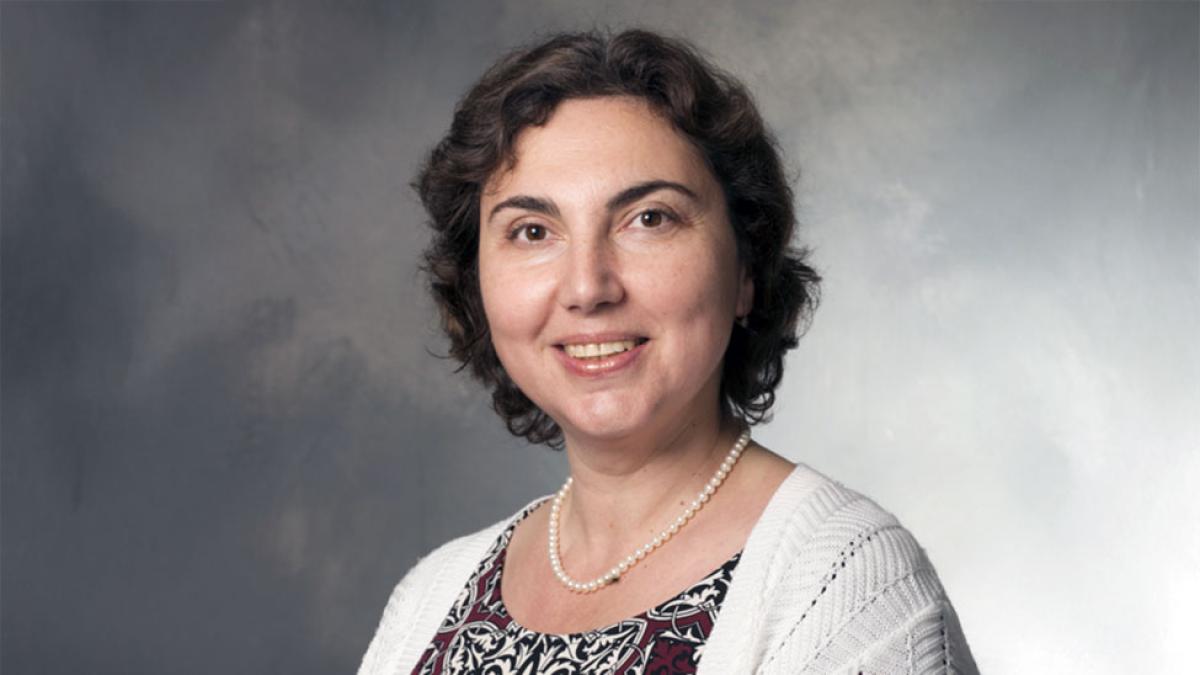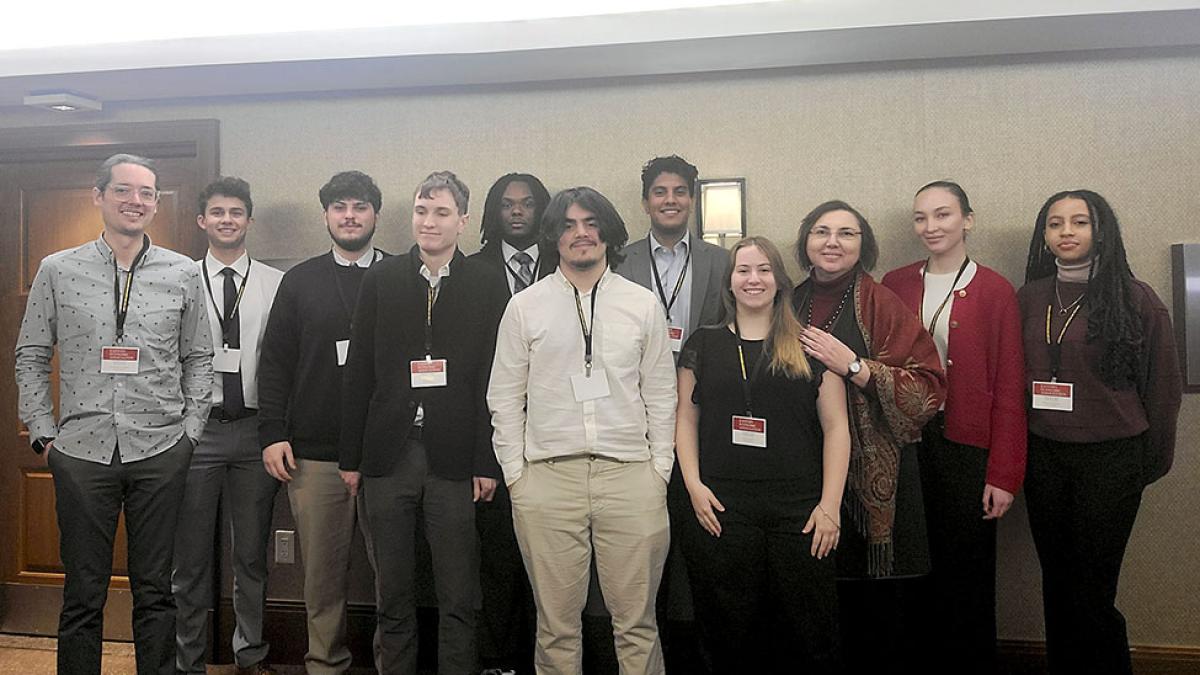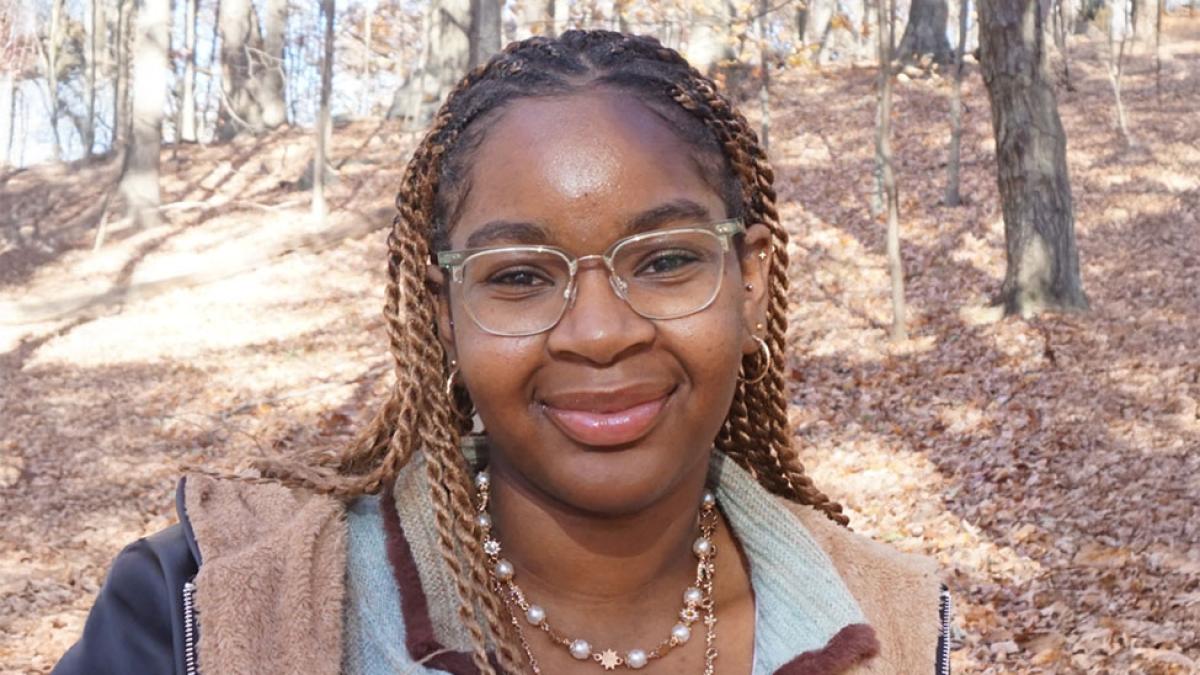
Pace Seidenberg Students Tackle Real-World Challenge at Aalto University’s Design Factory in Finland
Four students from Pace University’s Seidenberg School of Computer Science and Information Systems traveled to Espoo, Finland this fall to collaborate on a global innovation project at Aalto University’s Design Factory, home to one of the world’s leading centers of interdisciplinary design.


Four students from Pace University’s Seidenberg School of Computer Science and Information Systems traveled to Espoo, Finland this fall to collaborate on a global innovation project at Aalto University’s Design Factory, home to one of the world’s leading centers of interdisciplinary design.
Representing the New York City Design Factory (NYCDF), located in Pace’s Seidenberg School, the students joined an international cohort for Aalto’s Product Development Project (PdP) course, a yearlong challenge where teams co-create real-world prototypes for industry sponsors. Their team’s focus: advancing hydrodetection technology for PrinSys, an Aalto-affiliated research group working to commercialize leak detection systems.
“Students traveled to be onsite at Aalto University for a week of team building, workshops, and collaboration,” said Professor Jonathan Williams, the faculty lead for Pace’s team on this international project. “They took part in the PD6 workshop—short for ‘Product Development in 6 Hours’—with their client, PrinSys. The trip is connected to the IS 600: Graduate Independent Study in IS and CS 665: Product Development Project courses.”
A Creative Welcome
“Stepping into Aalto University’s Design Factory felt like entering a space where creativity meets engineering,” the student team shared. “Whiteboards filled with ideas, 3D models coming to life, and teams from around the world deep in discussion. The energy was inspiring and collaborative.”
Arvind Sharma (MS in Human Centered Design), Isaac Wirth (MS in Human Centered Design), Ledda Knudson (MS in Human Centered Design), and Remi Williams (BS in Information Technology) spent the week prototyping in the ProtoBunker, a hands-on workshop where “imagination turns into tangible prototypes,” and meeting with PrinSys representatives in person. “Through those conversations, we gained valuable insight into their goals and the context behind our challenge, helping us connect the technical problem to its human and societal impact.”

A Global Learning Experience
For Ledda, the trip offered a great opportunity to work side-by-side with her Aalto teammates and to form a global team. “We really dove deep into understanding our problem. It was energizing to see that we all share a passion for solving this global challenge and creating something valuable that can be used in many different countries,” Ledda said. “The trip also helped me see how design is a natural part of life in Finland—from small coffee shops and bakeries to iconic places like the Oodi Library, where every space feels intentional.”
Isaac found the trip a once-in-a-lifetime experience and was inspired by the collaborative environment. “I will never forget representing Pace at Aalto University for this project. We joined a team of students with experiences spanning mechanical and electrical engineering, software development, and design,” Isaac said. He was awed by Finland’s dedication to environmental sustainability through infrastructure and public programming. “My favorite part of the trip was visiting Oodi, Helsinki’s central library. We loved it so much that we actually went back a second time to do homework!”
Remi appreciated the hands-on nature of the workshop experience. “Our group developed a prototype designed to prevent water damage caused by leaks, and it was incredibly rewarding to troubleshoot and piece solutions together,” Remi said. She added that they “had access to everything from electrical tools and plumbing equipment to 3D printers, which made it feel like a designer’s dream. Our team included students from Pakistan, Estonia, and the Netherlands. It was inspiring to collaborate with people from such diverse educational backgrounds and interests.”
Arvind reflected on the takeaways of working in a multicultural design setting, and how powerful collaboration can be when everyone brings their own mindset to the table. “I learned how design thinking goes beyond ideas. It’s about understanding people, cultures, and the small details that shape user experience.” He added that “the energy inside Aalto’s Design Factory was inspiring. PD6 pushed me to think fast, communicate clearly, and trust my teammates even when things got uncertain. Somewhere along the way, I also discovered a new creative side in myself: direction and cinematography. That made the whole experience even more special.”
Next Steps
With new perspectives, international friendships, creative momentum, and real-world experience, the Pace team will now head to a well-deserved winter break. They will then continue their collaboration with PrinSys and the Aalto Design Factory through the spring semester, at the end of which the students will present their final work at Aalto University’s Product Development Gala, an international showcase of student innovation.
A Legacy of Excellence: Pace Economics Students Reclaim the National Federal Reserve Title
For the sixth time since 2014, Pace University’s Economics students have claimed the national title at the College Federal Reserve Challenge—continuing a legacy of excellence built on rigorous preparation, teamwork, and real-world economic analysis.


The Pace University Federal Reserve Challenge team won the 22nd annual College Federal Reserve Challenge national championship, beating competitors including Harvard (second place), University of California, Los Angeles (third place), University of Pennsylvania, University of Chicago, and Davidson College. This remarkable achievement, a continuation of long-standing success by the Pace team over the years, marks the sixth time since 2014 in which Pace University Economics department students have surpassed their peers in their knowledge of the US economy, central banking, and monetary policy.

This year's College Fed Challenge included 139 schools from 36 states across the nation, making this year’s field one of the largest in the program’s history. Representing the New York District at the national competition, after advancing from the New York Regional College Federal Reserve Challenge earlier in November, the exceptional Pace team included co-captains Giancarlo Raspanti ’26, Business Economics/MS Economic Analysis and Data Science and Suraj Sharma ’26, Business Economics/MS Economic Analysis and Data Science, and their presenting team colleagues Gianna Beck ’28 Computational Economics/MS Economic Analysis and Data Science; Brooklyn Bynum ‘26, Business Economics/MS Economic Analysis and Data Science; and Alexander Tuosto ’26, Business Economics/Finance (Lubin)/MS Economic Analysis and Data Science.
Also included in the team were student researchers Emina Bogdonavic ’28, Economics/MS Economic Analysis and Data Science; Sheira Dery ’27, Computational Economics; Gunnar Freeman ’26, Computational Economics; Amirkhan Mamatov ’27, Economics; Grace McGrath ‘26, Economics/MS Economic Analysis and Data Science; Kristina Nasteva ’26, Business Economics; Laura Melo ’27, Economics/MS Economic Analysis and Data Science; Oliver Ng ’27, Business Economics; and Harvey Nguyen ’26, Economics/MS Economic Analysis and Data Science.

These students analyzed economic and financial conditions, crafted a sophisticated monetary policy recommendation, and delivered a standout performance on the national stage. The team was guided by Professor Gregory Colman, PhD, head advisor, whose leadership continues to inspire championship-level excellence, in addition to Clinical Associate Professor Mark Weinstock, CBE, team coach.
Nearly two decades ago, Weinstock had a belief, a vision, that Pace’s Economics department, with its intelligent, ambitious, and hard-working students and incredibly talented faculty, could succeed in this prestigious competition. And he was right.
“Coaching the Fed Challenge has always been one of the most meaningful teaching experiences of my career. The opportunity to work with gifted students and to see them excel is spirit-lifting and thoroughly enjoyable. I'm most proud of the moments when I realize that students have achieved mastery of economics and finance that will allow them to reach the upper strata of the industry,” he said.
The incredible prowess of the Pace team also caught the attention of Fed Challenge Judge Thomas Lubik, who said, “Your team’s was the most perfect and complete performance I have ever seen at a College Fed Challenge. It was also incredibly close with the runner-up team, and we debated a good while until we settled on a winner. In the end, the way you worked as a team made the difference.”

Photo credit: Anna Shostya
Alexander Tuosto ’26, Business Economics/Finance (Lubin)/MS in Economic Analysis and Data Science, was one of the main Pace student presenters at the competition, and described how the team worked tirelessly, developing meaningful relationships throughout the process. It was also his first year on the team, but that didn’t stop his student colleagues from entrusting him with a key moment in the competition. He recounted:
“It was the last night of recording our first-round presentation, and after a seven-hour recording session, we were nearing the deadline without a take that we could confidently submit. I had messed up my line at the end of the perfect run which, at this point, was very frustrating. So much that it made me unsure if the team had made the right decision in choosing me. We took a short break from recording and my mentor [co-captain Giancarlo Raspanti ’26] and the other members of the team came into the classroom I was in. We talked for a little bit; they all put things into perspective and helped me get my mind back on track. We did one final take after that, and it was actually the run that we ended up submitting: it seriously felt like a movie moment, and I don't think I'll ever forget it.”
When asked about the “secret sauce” of the Pace team’s tradition of success over the years, previous team member and alumna Kelsey Berro ’15, Business Economics, responded, “Hard work, grit, determination, and a lack of entitlement. We have won because we study the hardest, prepare the most, and because we earn it.”
The College Federal Reserve Challenge has been a steadfast, prime example of experiential learning at Pace, and Federal Reserve Challenge team members have received both internships as students and gainful employment upon graduation. In turn, many have given back as alumni, returning to help train younger generations. Another standout feature of the Pace team is that it has seen consistent leadership by female students during its history at the competition, continuing the Economics department’s legacy of developing women leaders.
Read the official press release on the Federal Reserve Challenge win.
More from Pace
For Anna Shostya, PhD, economics is more than numbers—it’s a tool to inspire change, connect students to the world, and build life-long skills.
Twenty-four students, undergraduate and graduate, and five faculty members in the Economics department presented their original research at the Eastern Economic Association (EEA) annual conference, one of the major conferences for professional economists in the United States.
A go-getter at heart, Shaniah James '26, has excelled in research, student competitions, and internships—all while pursuing a combined BA/MS degree and setting her sights on a future in economic policy and market analysis. Learn more about her journey and advice for fellow students.
The Power of Data in Modern Marketing
Through hands-on projects, real datasets, and industry-standard tools, Professor Eunhee (Emily) Ko helps students bridge theory and practice. Her courses emphasize practical analytics skills, critical thinking, and portfolio-ready work students can confidently take into the job market.

Eunhee (Emily) Ko

Marketing
We connected with Professor Eunhee (Emily) Ko, a marketing scholar whose work blends quantitative research, data analytics, and real-world business experience. Since joining Pace in Fall 2023, Professor Ko has brought her passion for understanding consumer behavior and uncovering patterns in complex data to the Lubin School of Business. With a background that spans analytics training at Northwestern, a PhD from Emory, and hands-on industry and entrepreneurial experience, she equips students with the analytical tools and strategic mindset needed to thrive in today’s data-driven marketing landscape.
Why Marketing?
My academic and professional journey led me to quantitative marketing, where my work centers on data analytics and modeling. I discovered my passion for the field while in the Analytics program at Northwestern University, where I found excitement in learning analytical tools and uncovering patterns in real-world data. This experience inspired me to collaborate with a faculty member on a research project, which led to a conference publication and ultimately motivated me to pursue a PhD at Emory University.
At its core, marketing is about understanding human behavior in commercial contexts. In today’s competitive business environment, the ability to analyze consumer behavior and derive actionable insights is essential for organizational success. Quantitative marketing provides a powerful framework for bridging data, theory, and practice.
Through my research and teaching, I am continually inspired by the opportunity to help students and organizations interpret consumer behavior and make informed, strategic decisions. I enjoy contributing to the field and embracing my role as a scholar and educator in this dynamic discipline.
Why Lubin/Pace?
Lubin and Pace offer a unique combination of academic community, practical education, and professional opportunity. The collaborative environment fosters a strong sense of community where faculty support one another and share a commitment to student success. Lubin’s emphasis on application-driven learning aligns with my teaching philosophy, allowing students to work with real data, real business problems, and industry-relevant tools.
I am also excited about Pace’s supportive research environment, which encourages interdisciplinary work and provides resources that help faculty advance meaningful scholarship. The location in New York City offers unparalleled opportunities for industry partnerships, guest speakers, experiential projects, networking, and collaborative research.
Together, these elements make Lubin and Pace an ideal setting where I can contribute, grow, and help students prepare for successful careers.
Discuss your professional path and how it informs the way you teach.
My path blends academic training, industry experience, and entrepreneurship—all of which strongly shape how I teach. I completed a master’s degree in analytics at Northwestern University and a PhD in marketing at Emory University, building a strong foundation in data science, quantitative modeling, and evidence-based research.
Outside academia, I founded an e-commerce business and worked on contracted projects with major companies in Korea. These experiences gave me firsthand insight into how analytics, consumer behavior, and digital strategy operate in real business environments.
As a professor teaching courses such as Visual Analytics, Predictive Analytics, and Marketing Research, I draw directly on this background. I emphasize connecting theory to practice through real-world cases, hands-on projects, and industry tools. My entrepreneurial experience fosters creativity and problem-solving, while my research training helps students think critically, interpret data rigorously, and communicate insights clearly.
What are your research interests/areas?
My research spans online marketing and user-generated content (UGC)—including structured and unstructured formats such as text, images, and video—as well as applications of machine learning and econometric methods. I focus on the role of semantic features in UGC and how they influence tangible and intangible asset acquisition for businesses.
My work has been published in interdisciplinary journals such as Computers in Human Behaviour and the International Journal of Research in Marketing, as well as in proceedings from IEEE and AMC conferences.
Why is advancing research in this area meaningful or impactful?
Consumer behaviours have always been quickly changing, especially in this technology-led environment. The consumer behaviours of yesterday might not be the same as those of today, so constant research is essential.
My teaching style is fundamentally hands-on, practical, interactive, and committed to extending learning beyond the classroom.
I incorporate multiple analytical tools and platforms into my courses, ensuring that every student, without exception, develops the capability and confidence to use them effectively in a classroom setting. One example of supporting this goal is that I provide individualized and customized feedback to each student group so they can apply concepts accurately and avoid common pitfalls.
I place strong emphasis on real-world applicability. The final project is a core component in all my courses, allowing students to transfer the skills and knowledge gained in the classroom directly to real business or organizational contexts. My aim is for students to leave my classes with tools they can immediately use in their professional careers.
I strive to create an active learning environment by asking questions, encouraging participation, and designing activities that involve students in the learning process. Engagement is essential for helping students think critically and collaboratively.
Beyond the classroom, I actively encourage students to extend their work by participating in industry or academic conferences, campus events, and external presentations. Presenting to real audiences and receiving authentic feedback provides invaluable experience that strengthens their professional development, much like it did for me during my own academic journey.
What do students learn in your classroom that prepares them for the real world?
In my classes, students develop a blend of technical, analytical, and transferable skills that prepare them for real-world careers. Early in the semester, I include a one-session programming boot camp to ensure that every student, regardless of background, acquires the foundational coding skills needed for the course. This practical introduction to programming immediately equips students with tools widely used in industry, giving them confidence to work with data and analytical software in professional settings.
Throughout the semester, students engage in hands-on, experiential learning. After completing the lecture modules, they work on a final project where they apply the full range of techniques learned in class—data preprocessing, visualization, predictive modeling, and insight communication—to a real-world dataset. This project is intentionally designed to mirror professional analytics work so that students not only practice technical methods but also learn how to interpret results, make decisions, and articulate their findings effectively.
A memorable example comes from a student in my Visual Analytics course who later emailed me to share that she used her class project as part of a job interview presentation. The project helped her clearly demonstrate her analytical and communication skills, and she received an internship offer from a major U.S. company. Experiences like this reinforce my belief that class projects should not be treated as routine assignments but rather as opportunities to build meaningful portfolio pieces that students can confidently showcase to employers.
My goal is for students to leave my classroom with practical skills, strong problem-solving abilities, and a polished project that reflects their best work—something they can leverage immediately as they enter the job market.
How do you incorporate technology or digital tools to enhance learning?
I incorporate technology and digital tools extensively because my courses focus on data-driven methodologies and rapidly evolving contexts such as emerging patterns in consumer behavior. These subjects naturally require students to engage with modern analytical tools and technologies in order to fully understand and apply the concepts we cover.
In my classes, students learn programming languages commonly used in industry for data analysis and visualization. They apply these tools not only in regular assignments but also in their final projects, allowing them to practice real-world workflows and build technical confidence.
More recently, generative AI has emerged as a powerful supplement to traditional analytical tools. I encourage students to use Gen-AI responsibly, while emphasizing academic integrity and clear boundaries around plagiarism. To help them critically engage with this technology, I introduced a new assignment that requires students to experiment with Gen-AI for tasks such as data exploration, analysis, or visualization. The goal is for students to evaluate how these tools can support analytical work, understand their limitations, and develop informed judgment about when and how to use them effectively.
By integrating both established and emerging technologies, I ensure that students gain practical skills and remain adaptable in a rapidly changing digital landscape.
Why is it important to advance research in this area or these areas?
Advancing research in the marketing area is essential because consumer behavior is evolving at an unprecedented pace. With emerging technologies and rapidly transforming purchasing environments, the way consumers shop today is fundamentally different from even three years ago. As digital platforms, AI-driven tools, and personalized recommendation systems continue to reshape the marketplace, marketers must continually update their understanding of how consumers make decisions.
At the same time, new forms of consumer-generated data—ranging from clickstream patterns to social media interactions and mobile behaviors—offer powerful opportunities to uncover emerging trends in the consumer journey. To fully leverage these rich data sources, researchers must adopt new analytical techniques and technologies capable of operating at scale.
For these reasons, marketing research must continually advance. Staying at the forefront of methodological innovation allows us to capture shifting behaviors, understand consumer needs more accurately, and develop insights that are relevant in today’s dynamic environment. Ultimately, advancing research in these areas is critical for keeping the field aligned with real-world changes and for helping businesses make informed, data-driven decisions.
What are some challenges you had to overcome to get to where you are today?
One of the major challenges I faced on my professional path was transitioning into the analytics field. Entering this area required me to quickly learn a new set of technologies and tools for working with big data and unstructured data, skills that came with a steep learning curve. At times, it felt overwhelming to adapt to new programming languages, analytical methods, and rapidly evolving digital tools.
What helped me overcome these challenges was the strong support system around me. I had an excellent mentor in the program who guided my learning and encouraged me to persist through difficult moments. I was also surrounded by talented classmates whose insights and dedication pushed me to grow. This network of supportive peers and mentors provided both inspiration and practical help, making it possible for me to build the skills I needed to succeed.
Looking back, the combination of perseverance, a willingness to learn new technologies, and a strong professional community was instrumental in helping me advance to where I am today.
Of which triumph are you most proud?
The triumph I am most proud of is my students’ success. Nothing is more rewarding than seeing how far they go after completing my courses. Several students have reached out to share their graduate school acceptances, job offers, or internship experiences, and knowing that my teaching played even a small role in their journey is incredibly fulfilling.
One of the moments I cherish most is meeting my students again at graduation ceremonies. Seeing them walk across the stage, confident and excited for the next chapter, reminds me why I chose this profession. Their accomplishments feel like shared victories, and they are the achievements I value most in my career.
What is the single most important lesson you’d like to impart to your students?
Embrace challenge and persistence. I want my students to understand that facing difficulty and continuing to push forward are essential parts of learning and long-term success.
What does #LubinLife mean to you?
#LubinLife means being part of a supportive and ambitious community where students, faculty, and professionals work together to help each other grow. It represents a culture of mentorship, collaboration, and encouragement that extends beyond the classroom.
Classes Professor Ko Teaches
- MAR 222: Marketing Research
- MAR 368: Visual Analytics
- MAR 495: Business Honors Programs Senior Thesis In Marketing
- MAR 635: Marketing Research
- MAR 657: Visual Analytics
- MGT 684: Marketing Research
- MAR 664: Predictive Analytics
Shaping the Future of Sustainable Communities: Highlights from the 24th Alfred B. DelBello Land Use and Sustainable Development Conference
The Elisabeth Haub School of Law at Pace University’s Land Use Law Center recently hosted the 24th Annual Alfred B. DelBello Land Use and Sustainable Development Conference, continuing its long-standing tradition of convening leaders in land use, environmental law, and public policy to address the challenges and opportunities facing communities today.


The Elisabeth Haub School of Law at Pace University’s Land Use Law Center recently hosted the 24th Annual Alfred B. DelBello Land Use and Sustainable Development Conference, continuing its long-standing tradition of convening leaders in land use, environmental law, and public policy to address the challenges and opportunities facing communities today. Held in December 2025, the conference focused on the theme “Fostering the Development of Sustainable Communities Through Innovative Strategies,” bringing together practitioners, policymakers, scholars, and students for thoughtful discussion on land use planning, environmental protection, and sustainable development.

The conference opened with two ethics focused sessions followed by welcome remarks from Elisabeth Haub School of Law at Pace University Dean Horace E. Anderson, Jr. Dean Anderson’s remarks reflected both the long-standing history and impact of the LULC Conference while also recognizing the retirement of Tom Bourgeois, Director for Policy and Research at the Land Use Law Center, after 25 years of dedication to Pace Haub Law. “Tom’s contributions have been extraordinary,” shared Dean Anderson. “His expertise in energy efficiency, distributed energy systems, microgrids, geothermal networks, and resilient infrastructure has positioned our Land Use Law Center as a national leader at the intersection of energy and land use policy. Tom leaves a legacy that has helped shaped cutting-edge research and informed sustainable development strategies across the Northeast and beyond, and we thank him for all he has done for the Law School.” A morning keynote session was also delivered by Arthur C. Nelson, Ph.D., FAcSS, FAICP, Emeritus Professor of Urban Planning and Real Estate Development, and Geography, University of Arizona on trends in housing demands – past, present, and future. Several engaging early afternoon breakout sessions were held as well focusing on timely topics.
During the conference, the annual Groundbreaker’s Award was presented to Catherine F. Parker, Westchester County Board of Legislators, 7th District. During the presentation, it was noted that Legislator Parker has dedicated her career to strengthening Westchester County’s environmental resilience and fostering sustainable, community-driven growth. She has also championed landmark initiatives that reflect the principles taught by the Land Use Law Center’s Land Use Leadership Alliance (LULA) program and helped expand access to the LULA program.
A highlight of the conference was Shelley Poticha, Managing Director for Regional Impact, NRDC, delivering an informative keynote address on Taking Ambitious Action Now: Lessons from the American Sustainable Cities Initiative. During the keynote, Shelley discussed the American Sustainable Cities Initiatives, a 10-year effort to build the capacity of local change-makers. She noted that this initiative is a way for local leaders to experiment with ambitious solutions and find new ways to make their communities more livable and sustainable. The afternoon portion of the conference also included additional breakout sessions, a law update session, and a wine and cheese reception.
Founder’s Award Reception and Honorees

The conference was preceded by the Founder’s Award Reception, where three individuals were honored:
- Thomas M. Roach, Mayor, City of White Plains, New York, received the Founder’s Award for his exemplary leadership in the City of White Plains and his career-long commitment to community collaboration and positive change.
- Maximillian R. Mahalek, Esq., an associate at Cuddy & Feder LLP and a Haub Law alumnus, was honored with the Distinguished Young Attorney Award for his contributions to land use and real estate law.
- Emily A. Petermann, a current Haub Law student, received the John R. Nolon Student Achievement Award for her dedication and commitment to excellence in fulfilling the mission of the Land Use Law Center.
Supporting Sustainability Through Collaboration
Each year, the Conference is made possible by the generosity of a significant number of sponsors who believe in the mission of the Land Use Law Center and the importance of this annual conference. This year, top sponsors included DelBello Donnellan Weingarten Wise & Wiederkehr, LLP, Collins Capital Partners LLC, Zarin & Steinmetz LLP, The Oram Foundation, Inc., Cuddy & Feder LLP, and Hocherman, Tortorella, and Wekstein, LLP. For more details visit the 2025 Conference agenda program (PDF).
Your Next Trip Could Be Riskier Than You Think—Here’s Why
Lubin Professor Andrew Coggins provides expert insight to Forbes on how travelers can evaluate safety risks in an increasingly volatile global environment. He notes that determining whether a destination is dangerous requires balancing personal risk tolerance with real-time conditions, and that indicators such as unstable governments, civil unrest, and high crime often surface before they make headlines.
Universities Seek NYC Real Estate In Effort To Keep Their Relevance
Bisnow reports President Krislov joined higher ed and real estate leaders to discuss how universities are reshaping New York City’s real estate landscape to stay relevant and competitive. The piece notes Pace’s role—alongside institutions like New York Law School and Vanderbilt University—in leveraging campus investment, location, and property strategy to support enrollment, student experience, and long-term institutional resilience.
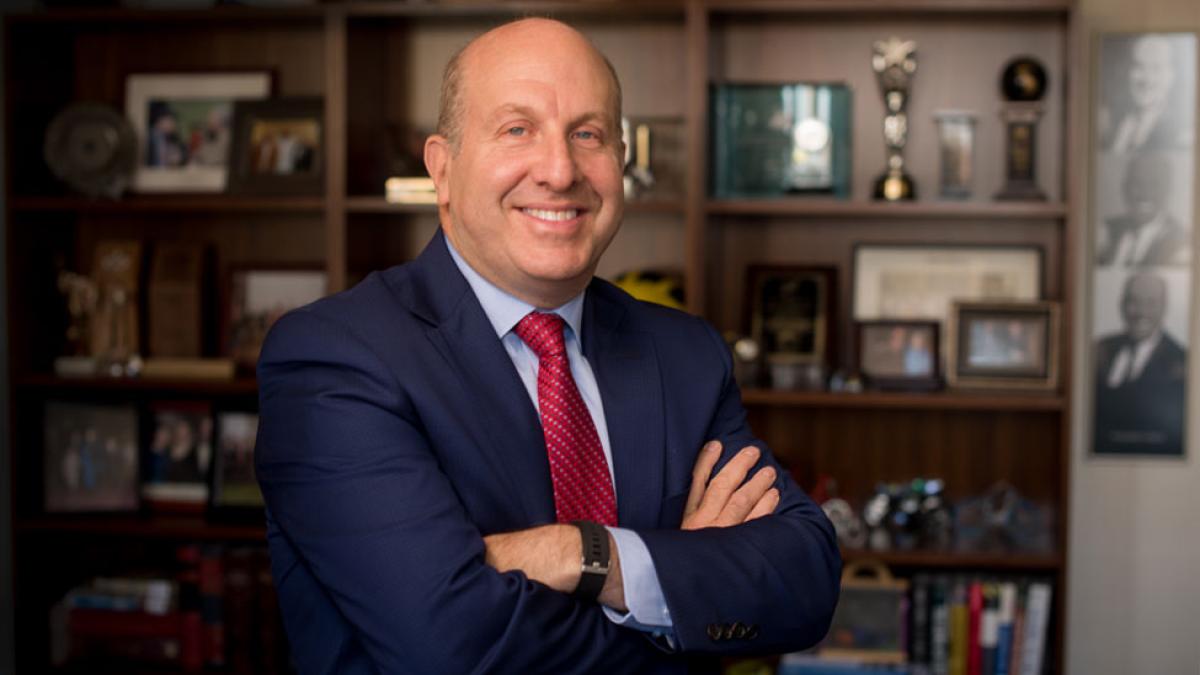
Op-Ed | New York’s Court of Appeals Allows Jury Of 11 To Convict Criminal Defendant
Pace Haub Law Professor Bennett Gershman pens an op-ed in amNewYork responding to a historic decision by the New York Court of Appeals that, in one case, allowed a criminal conviction by a jury of 11 after a defendant was found to have tampered with a juror. Professor Gershman explains the court’s reasoning and the broader implications for jury practices in New York’s justice system.
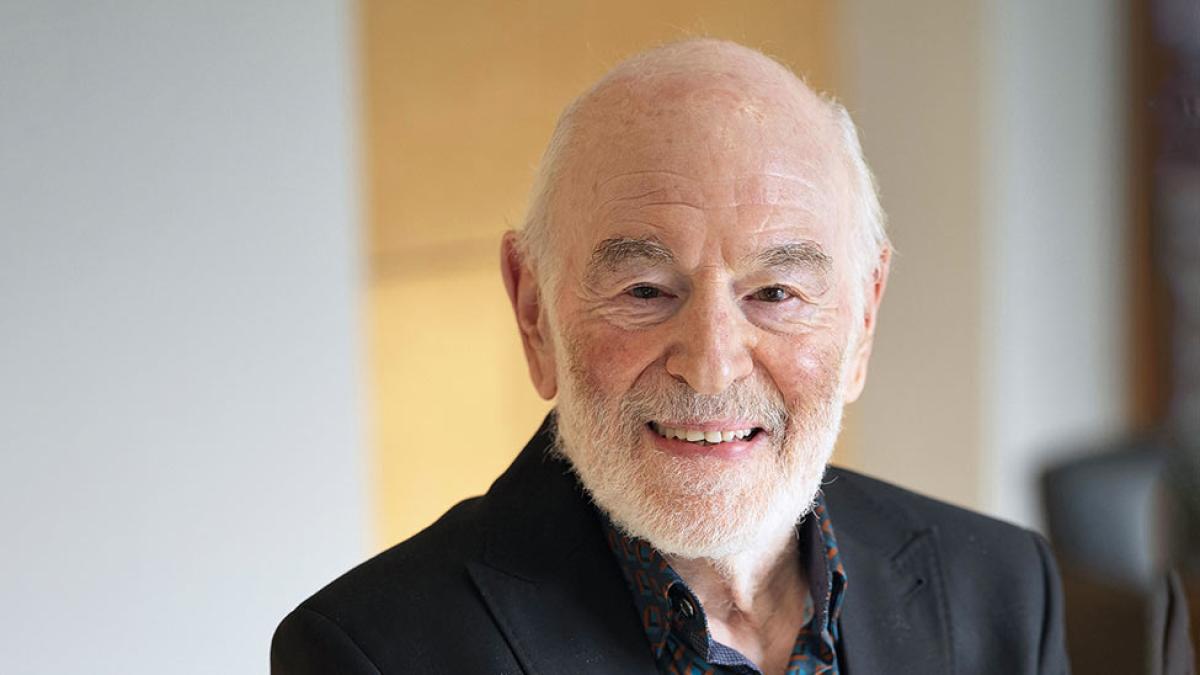
Apartment Living, Conflict Over Noise
Dyson Professor Seong Jae Min writes a piece in The Korea Times examining South Korea’s growing conflicts over apartment noise—everyday sounds that can escalate into major disputes. Drawing on cultural context and urban trends, he argues that resolving these tensions requires both improved building standards and stronger community norms.
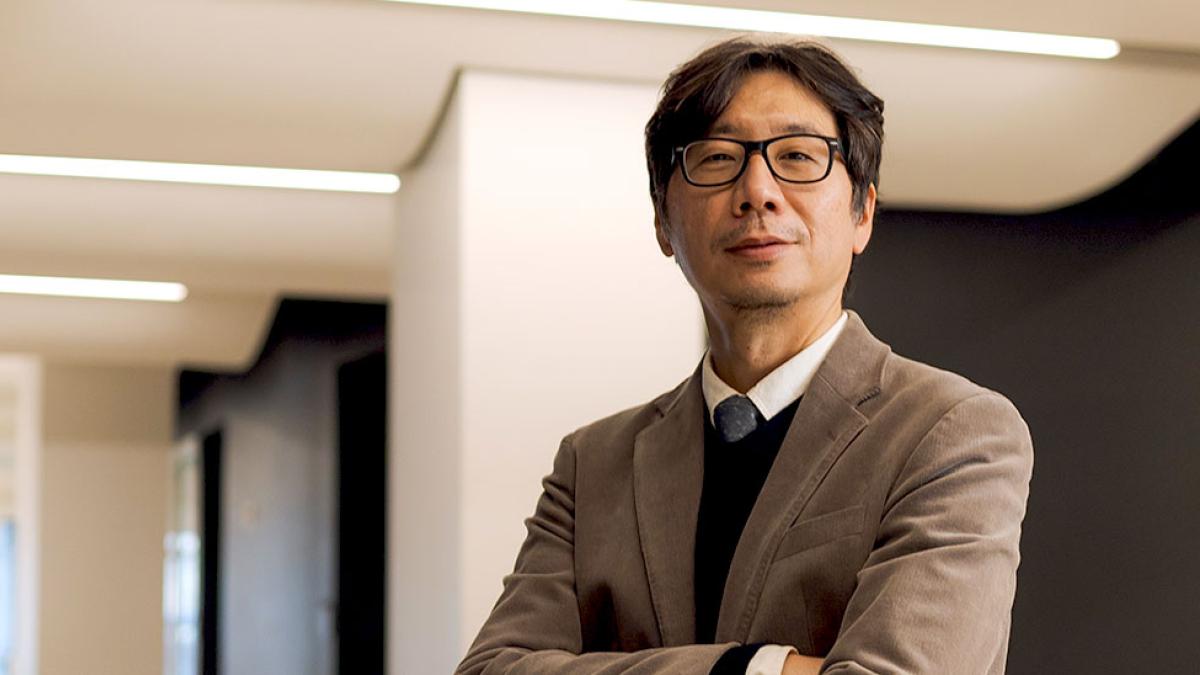
Alison Carr-Chellman Appointed Provost of Pace University
Women in Academia Report highlights a major leadership announcement: Alison Carr-Chellman has been appointed provost and executive vice president for academic affairs at Pace University and will begin her role on January 20.
Pace to Launch Bachelor of Science in Artificial Intelligence in Fall 2026
The Business Council of Westchester spotlights Pace’s expanding footprint in AI education, highlighting the launch of a new Bachelor of Science in Artificial Intelligence, beginning in Fall 2026 through the Seidenberg School of Computer Science and Information Systems.
